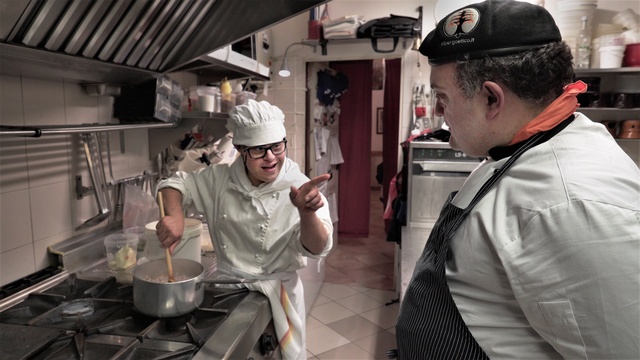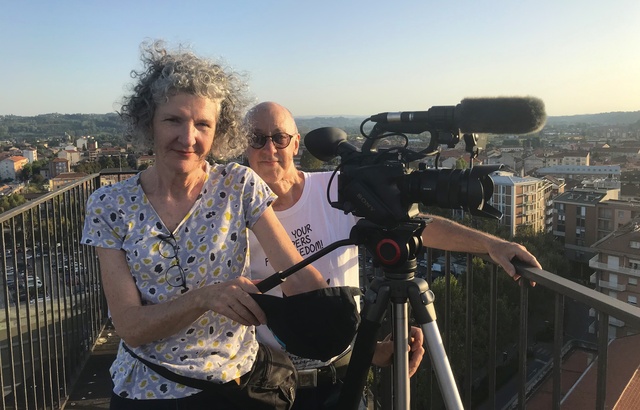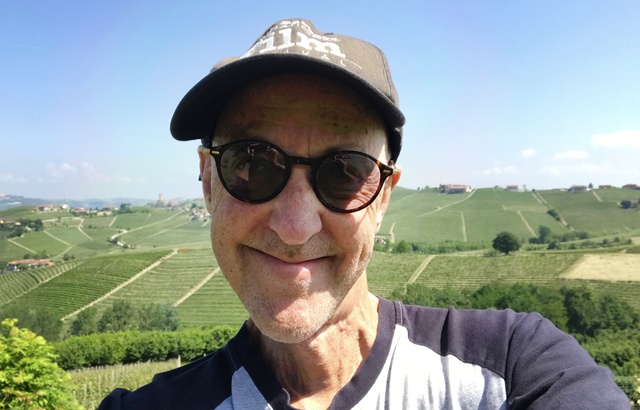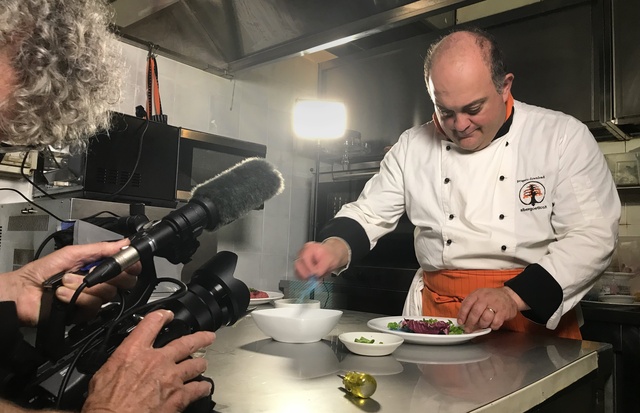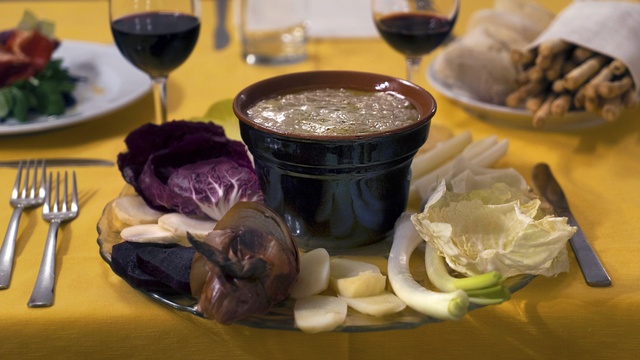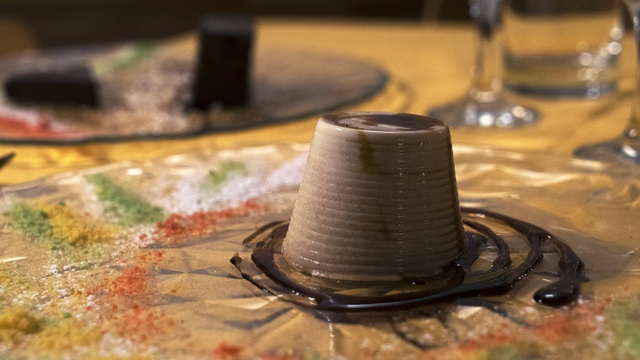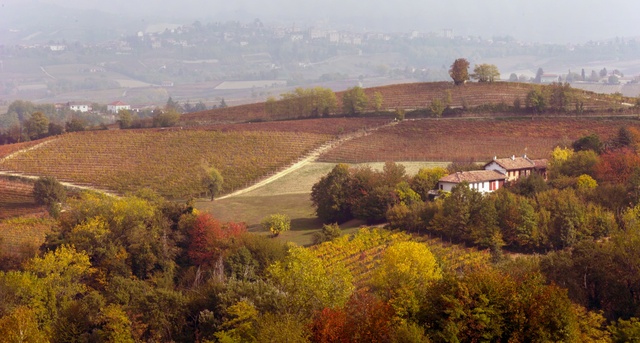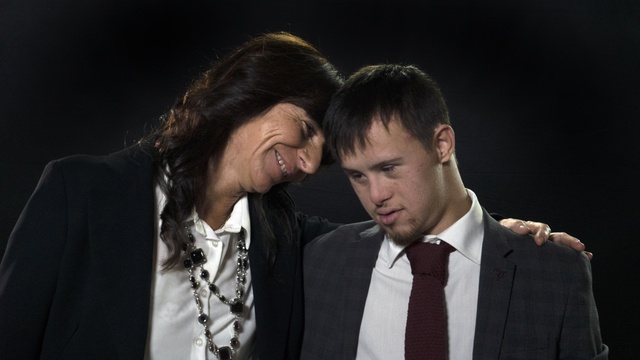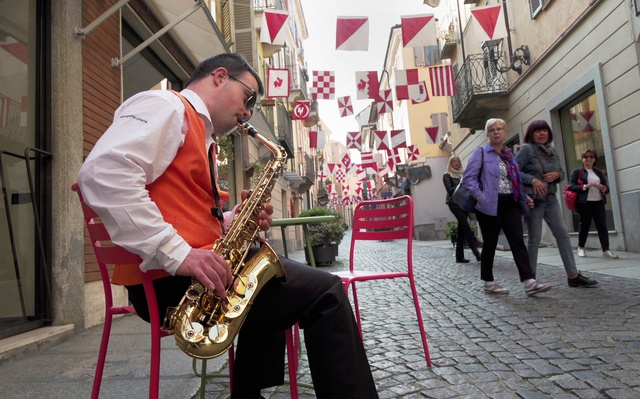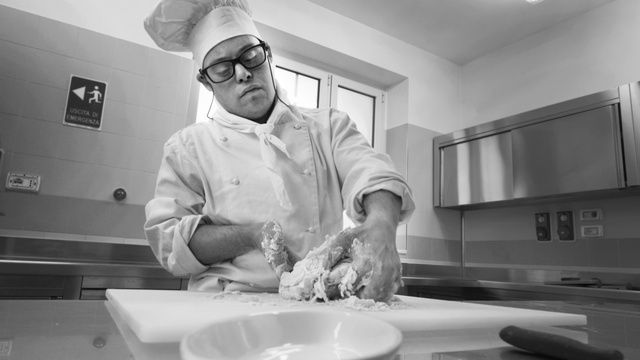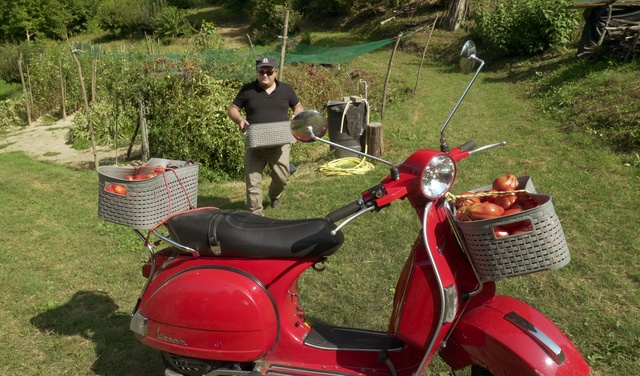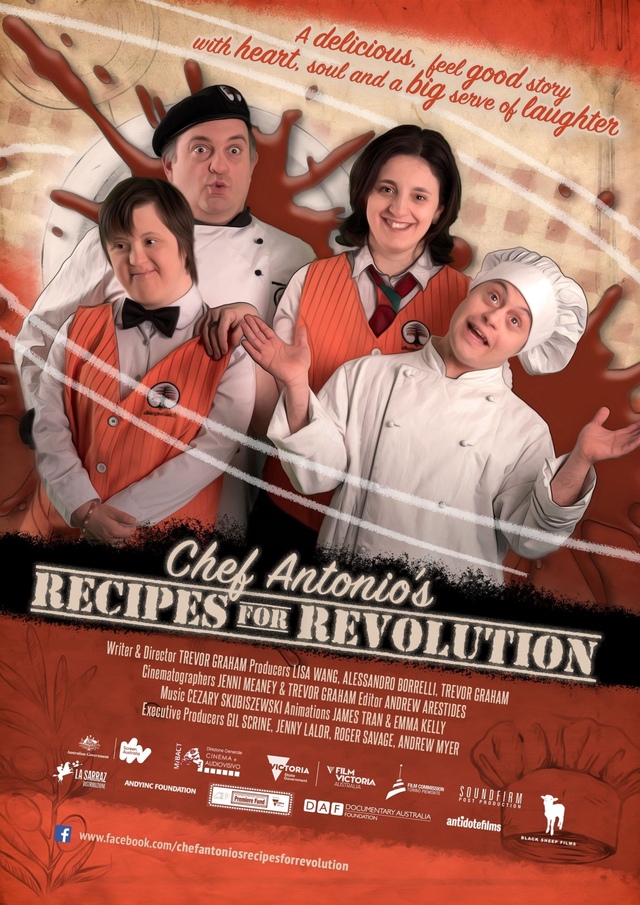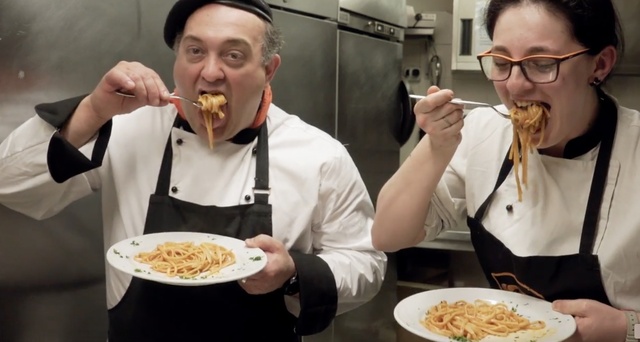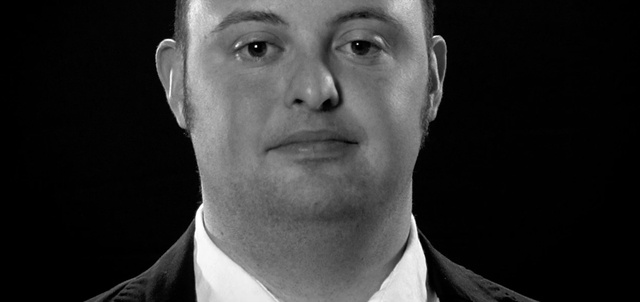He’s a man of conviction, showing that empathy and understanding have a vital part to play in the world, especially when it comes to the enjoyment of food in a supportive setting. ERLE LEVEY talks to Dr Trevor Graham about his inspirational movie Chef Antonio’s Recipes for Revolution that screens at Kandanga as part of GourMay.
“It’s a similar story with food – particularly the way it can bring people of different backgrounds together. There is no better way than to experience Italian hospitality, Italian food and Italian inclusion.“
Time chooses the right moment.
In life, we can talk as much as we like about getting our timing right. Yet in reality it’s a matter of recognising opportunity when it presents itself and acting on that.
There are moments when we know it is the right time.
That has been the case for awarded Australian filmmaker Dr Trevor Graham during his distinguished career.
Whether it be a documentary about the struggle for land rights, homelessness, the conditions for women during the Great Depression, or the little-known aspect of chemical testing in Australian wartime history.
Trevor’s credits also include a love of food, and larger themes to go with it such as social inclusion.
That is why Slow Food Noosa has chosen his movie Chef Antonio’s Recipes for Revolution for its film with food screening at Kandanga as part of GourMay.
The screening is on Thursday, 8 May, as part of the first week of the month-long celebration of food in the Mary Valley.
Chef Antonio is the first official Australian-Italian documentary co-production.
It fits perfectly with the Slow Food philosophy of good food, good company, and good community. As well as that, it was filmed over three years in the Italian region of Piedmont, where much of the world-wide Slow Food movement is based.
In a phone interview with Trevor we talked about his interest in social consciousness, and the way we have both, while on different journeys in life, come across some of the same people who have influenced us at various stages.
It’s a similar story with food – particularly the way it can bring people of different backgrounds together. There is no better way than to experience Italian hospitality, Italian food and Italian inclusion.
For Trevor, making the Chef Antonio film was an opportunity of a lifetime, not just for him but for people who otherwise have often been shunned by society, or given very limited options within their families.
Antonio de Benedetto is the chef at Albergo Etico – the Ethical Hotel – in this northern region of Italy and wants to change, or harmonise the world, as he says, with good Italian food, made and served by people with Down syndrome.
Training and employment at the hotel and chef Antonio’s restaurant, opens the door to future independent living for the trainees, so they too can take their place at the table of life.
The movie is a personal story, one full of humanity and affection.
“It’s a personal film,’’ Trevor said, “like most I am involved in.
“What makes it strong is that it combines social texture with time. I have pushed the personal side … that attracts me.’’
Trevor is Sydney based and a former Commissioning Editor for Documentary at SBS TV.
Make Hummus Not War had its world premiere at the Melbourne International Film Festival in 2012 and screened at the Berlin and San Sebastian Film Festivals in 2013. This was followed by Monsieur Mayonnaise in 2016.
With Mabo: Life of an Island Man (1997) Trevor talks about his personal connection with Eddie Mabo and the importance of Mabo’s work in the historic High Court decision of 1992 on native title. The landmark case overturned the myth of terra nullius – that no-one lived on the Australian continent before white settlement.
From Little Things Big Things Grow saw singer-songwriters Kevin Carmody and Paul Kelly discuss the song of the same name, about the Wave Hill walkout in 1966. That was when the Gurindji people – led by Vincent Lingiari – went on strike to get their land back from British Lord Vestey.
“Films such as these are full of politics and people but I’m looking to personalise that … not hitting the audience on the head.
“I’m not a placard filmmaker. These are personal stories.’’
It’s the ability to take the audience on a journey through a story and the lives of people you are working with. In that way you hope for a greater appreciation at the end.
In so doing it makes it a matter of what the people and what the film is about, and a reflection on our own lives – but also an opportunity to enjoy the film as well.
“A good film can provoke you to think,’’ Trevor said, “… you can have a laugh but come out at the end with better understanding of the issues.’’
The making of Chef Antonio started over dinner with friends in Sydney who have a daughter that suffers from Down syndrome.
The evening was shared with Trevor’s editor Andrew Arestides and his wife Tracylee, who is an advocate for people with a disability rather than an activist.
Tracylee had had a lot of experience in this field and was aware of the social context – the way her family had experienced life – and insisted she had a great story idea.
“She knew very well that I have a passion for social issue films with food themes,’’ Trevor said about their family friend.
“I was fishing for story ideas to complete my trilogy of food-themed documentaries.
“Tracylee had recently been to Asti in northern Italy and stayed at an extraordinary hotel, the Albergo Etico, and met the inspirational chef at the heart of it all, Antonio de Benedetto.
“Tracylee told me how revolutionary the Albergo Etico and the Tacabanda Restaurant are for people living with Down syndrome. And more than that, its chef was a great character who would work well on screen.
“His recipes were delicious, and true to the unique, regional Piemontese cuisine.
“My appetite was whetted and within months I was on a plane to Asti with cinematographer Jenni Meaney.
“I was taking a punt. But I figured if the scenarios were as good as Tracylee suggested, and I trusted her judgement, then let’s go and film it properly.
“Little did I know that this would be the first of seven film shoots and that I would be going back and forth between Sydney and Asti for the next three years.’’
So, not only had Trevor and I met some of the same people but here we were talking about the same region of Italy that I had visited in 2019, and again in 2022 – the latter to attend the Slow Food International festival held at Turin every two years.
The 2019 trip was with Oriana Choir and performances were held in these areas which would, only months later, be among the heavily impacted by Covid pandemic.
The upshot was the choir dedicated its performances in Brisbane and the Gympie, Noosa and Sunshine Coast regions in 2020 to the people of Italy.
In his production notes Trevor said the movie was a closely-observed human story, one that resulted from six months of filming between 2017 and 2020.
“Over this period, I lived at the hotel and ate at the Tacabanda Restaurant, so I had great access to their work places and witnessed their day to day lives, from morning to night.’’
When Trevor first met trainee chef Mirko Piras and waitress Jessica Berta, he could not help but feel inspired.
Mirko is a young man born with Down syndrome who dreams of becoming a great chef ‘just like Antonio’ and Jessica, an ambitious waitress who’s also set her sights on a career among the pots and pans.
“Mirko talked eloquently about his life, his girlfriend Francesca, his dreams and aspirations.
“One of the first things he told me was, ‘Francesca is an angel. I want to marry her.’
“So, when I eventually met Francesca and Mirko’s mother Franca, I knew there was a fabulous family story just waiting to be told.’’
Yet Chef Antonio would be the lynchpin, the glue, for the story.
On screen, a director cannot ask for a more compelling character than Chef Antonio, Trevor said.
“His humour and warmth, his passion for food and wish to enhance the lives of his trainees living with Down syndrome is captivating.
“His kitchen is miniscule, but in it a huge social revolution has begun for people with intellectual disabilities. His innovations are changing lives.
“Chef Antonio’s personal narrative has tremendous appeal. The Albergo Etico trains people with intellectual disabilities to work in all areas of hospitality, as chefs, hotel workers, and waiters.
“It’s an opportunity of a lifetime, for people who otherwise have often been shunned by society, or given very limited options within their families.
“Training at the hotel opens the door to future independent living for the trainees.’’
Over the three years of filming the bonds of friendship grew to be very strong, Trevor said. So much so, that the filmmakers ’disappeared.’
The action in front of camera was raw, spontaneous, humorous and sometimes dramatic. They were creating the story in real time.
In doing so, Trevor and cinematographer Jenni Meaney wanted audiences to engage directly with the faces, the eyes, the smiles and frowns, because of the way they revealed so much.
Throughout the film, Mirko’s personal family story unfolds and audiences find out about Down syndrome, not through facts or statistics, but personal family stories.
Moral and ethical questions can arise in a film dealing with disability. At test screenings some audiences thought lines had been crossed while
others felt it reflected real life.
However, the true test came when Mirko and his mother Franca viewed the entire film just before it was completed, Trevor said.
“This can be challenging for a director and confronting for participants. But … they loved it. So did Antonio.
“There were tears, laughter and genuine enjoyment. It’s fantastic how humour can transcend culture and language. The sound of laughter in the air was magic.’’
The film shoot itself was not without its own dramas – particularly the last 10-day shoot in March 2020, when Covid-19 broke out in the neighbouring northern region of Lombardy with escalating infections and a devastating death toll.
Trevor had felt safe in Asti, but that too vanished.
“The town was soon deserted. We woke up to empty streets and empty restaurants.
“The joie-de-vie of this small town was quickly shattered and replaced with fear.
Antonio’s restaurant came to a standstill. All the trainees returned to their families.
It rapidly became very dramatic, and more than a little scary for the film crew in terms of getting back to Australia.
“We left in the nick of time, with our (film) rushes and gear, just as Italy went into total lockdown.
“But we left something of ourselves behind – bonds of friendship, bound more tightly by the threat of the encroaching virus. The moments of goodbye were tense awful and quick.
“Not the usual, abbraccio, a hug and kiss on both cheeks, that is molto Italiano.
“Would this be the last time we would see each other? Would we get out of Italy? What would be the destiny of our friends and colleagues we were leaving behind – the many families we’ve been working with to make our film?
“The virus in the north was quickly spreading and killing people. Our exodus was tense and a little frightening, but we made it home safely, and virus free.
“Importantly, all the folks in Asti survived, and none were infected. After more than three months of lock-down the hotel opened again and also the Tacabanda.’’
Trevor ended up staying a total six months at the hotel. That way he got to live in, to see everyone on day-to-day basis for weeks.
It gave a sense of time and understanding of the changes in their various lives.
“That’s the backbone of the film. The people in Asti got to know me well.
“We went to the same places to eat, to get a gelato, and to get a sense of what the town is like as well.’’
Chef Antonio was released in Australia at the Melbourne Film Festival after Covid finished. It was to have been screened the year before but had to be postponed, then the festival was finally screened on-line.
The movie was released for audiences six months later and has since been screened right around Australia.
“It’s been particularly pleasing,’’ Trevor said. “It has screened at dozens and dozens of theatres … both in cities and small communities.
“I feel it gives a sense of hope for people – able to inspire with its sense of human consideration.
“Instead of people being shunted to the sideline, it shows what is possible and what can be achieved when given the opportunity.
“With basic training you can soar to unknown heights.’’
Trevor will be “live’’ by zoom at the Kandanga screening.
Slow Food Noosa Snail of Approval chef Josh Smallwood will lead the Slow Food team with a menu that matches the Italian theme.
“It will be great to have some food with the film,’’ Trevor said. “It was sensational when it was released in Italy … with all the people who were involved.
“There was a big celebration in the town and in the little towns and villages in the north of Italy.
“Our last screening was in Sicily. It is still being used … we hear about screenings from around the world.
“A favourite scene is when the manager of the hotel arrives, says good morning, and what do they do … hug and kiss. Can you imagine that happening here?
“I think of having faith in our sense of community and being able to change.
“It is a chef who started the hotel but went on to create a movement in which people can come together.
“The people with a disability get employment and income. But the reverse happens as well – the guests can meet and engage with them
“It’s a two-way exchange. That is it – food is a vehicle for social change.’’
Trevor is a big fan of following one’s intuition in filmmaking.
As director, he likes to leave audiences contemplating one significant question about a film: “What does ‘normal’ mean?’’
“Removing the boxes we humans tend to place people in, is the first priority of the film. This is very much the take-away theme from the film.’’
This movie comes at an important time and reminds us of the importance of timing.
We can all recollect moments where time has had a big impact on our outcomes. But do we really choose the right time, or does time present itself at opportune moments?
Sometimes, we just ‘know’ it is the right time … when it is. It’s one of the things that makes us uniquely human.
Trevor Graham’s timing on this film is a brilliant reminder of this – and our humanity.
FAST FACTS
What: Slow Food Noosa’s film with food night
Film: Chef Antonio’s Recipes for Revolution
Filmmaker, Dr Trevor Graham, will be “live’’ by zoom on the night
When: Thursday, 8 May, 6pm
Where: Kandanga Hall, Main St, Kandanga
Tickets: events.humanitix.com/slowfoodnoosa

